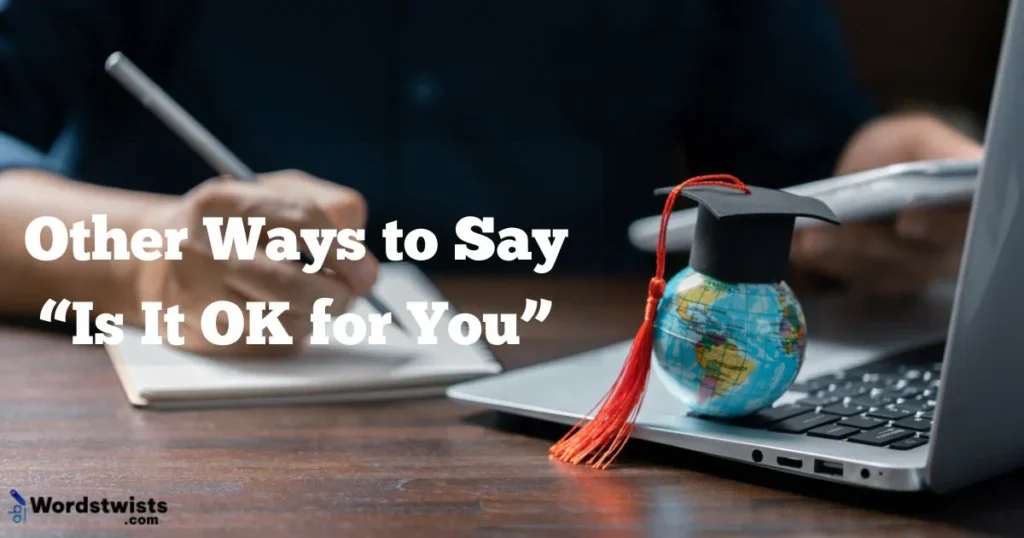Sometimes, we all get stuck using the same phrase over and over—like “Is it OK for you?” It’s a simple question, but when it pops up too often, it can feel dull and repetitive. If you’re like me, you want your conversations, emails, or writing to sound fresh, clear, and full of personality. That’s why finding other ways to ask “Is it OK for you” isn’t just helpful—it’s a game changer.
Using different expressions shows that you care about how you communicate. It makes your words more precise, polite, and interesting. Plus, it can help you connect better with others because your language feels thoughtful and respectful. Whether you’re asking a friend, a colleague, or a client, having a variety of phrases at your fingertips can boost your communication skills and make your speech or writing stand out.
Ready to upgrade your everyday language? Below, I’ve gathered 25 fresh and friendly alternatives to “Is it OK for you” that you can easily use in many situations. After the list, I’ll explain each phrase with examples and tips on how to use them perfectly. Let’s make your words work smarter, not harder!
Alternatives to “Is It OK for You”
1. Does that work for you?
This is a casual and clear way to check if someone agrees or if the plan fits their needs. It’s simple and widely used in both informal and formal settings.
Examples:
- Does that work for you if we meet at 3 pm?
- I can send the report by Friday. Does that work for you?
- We plan to start next Monday. Does that work for you?
- I’ll reserve the room for the meeting. Does that work for you?
- The deadline is flexible. Does that work for you?
Why it works:
This phrase is direct and easy to understand. It shows consideration and invites feedback, making it perfect for effective communication.
2. Are you comfortable with that?
Use this when you want to check not only agreement but also if someone feels at ease with a decision or idea.
Examples:
- Are you comfortable with the new project timeline?
- If we change the design, are you comfortable with that?
- Are you comfortable with working remotely?
- We’re planning a group presentation. Are you comfortable with that?
- Are you comfortable with the budget adjustments?
Why it works:
It goes beyond just asking for approval; it shows empathy and respect for the other person’s feelings or preferences.
3. Is that acceptable to you?
A polite and slightly formal way to ask if something meets someone’s standards or approval.
Examples:
- Is that acceptable to you if we extend the deadline?
- The contract has been updated. Is that acceptable to you?
- We proposed a new policy. Is that acceptable to you?
- Is that acceptable to you to proceed with the plan?
- Is that acceptable to you for the project scope?
Why it works:
It signals professionalism and is perfect for business or formal conversations where clarity and respect matter.
4. Would that be alright?
This phrase is gentle and friendly, great for casual and polite requests.
Examples:
- Would that be alright if I join the meeting a bit late?
- I’ll send the details tomorrow. Would that be alright?
- Would that be alright to postpone the call?
- Would that be alright if we change the venue?
- Would that be alright for you to take on this task?
Why it works:
It softens the question, making the other person feel comfortable sharing their true thoughts.
5. Are you fine with this?
A straightforward way to ask for agreement that’s informal and easy.
Examples:
- Are you fine with this schedule?
- Are you fine with this plan?
- Are you fine with us going ahead?
- Are you fine with the proposed changes?
- Are you fine with the budget?
Why it works:
It’s quick and clear, making it suitable for everyday conversations where simplicity matters.
6. Does this suit you?
This phrase is polite and works well when offering a choice, especially with plans, time slots, or preferences.
Examples:
- We’re thinking of 10 a.m. for the call. Does this suit you?
- I can deliver the package tomorrow. Does this suit you?
- We’ve made some updates. Does this suit you better?
- Lunch at the cafe—does this suit you?
- How about Friday afternoon? Does this suit you?
Why it works:
It shows you’re considering the other person’s comfort and gives them space to say yes or suggest another option.
7. Is this okay by you?
A natural, easygoing question that’s great for everyday conversation, especially when confirming someone’s agreement.
Examples:
- We’ll split the bill. Is this okay by you?
- I’ll bring the snacks. Is this okay by you?
- Is this okay by you if I leave a bit early?
- I changed the title a little. Is this okay by you?
- We switched the roles. Is this okay by you?
Why it works:
It sounds personal and friendly, showing openness while still keeping the tone light.
8. Would you agree to that?
This phrase is ideal when you want someone’s clear approval, especially in decisions or formal matters.
Examples:
- We’ve set the terms. Would you agree to that?
- We suggest a later deadline. Would you agree to that?
- Let’s try a different approach. Would you agree to that?
- We’d like to start earlier. Would you agree to that?
- Would you agree to that proposal?
Why it works:
It invites collaboration and makes the other person feel like a respected part of the process.
9. Does that fit your schedule?
Use this when suggesting a time or plan, especially when trying to be respectful of someone’s availability.
Examples:
- We’ve got 2 p.m. open. Does that fit your schedule?
- I’ll need 30 minutes of your time. Does that fit your schedule?
- Our next session is on Thursday. Does that fit your schedule?
- The review meeting is Monday morning. Does that fit your schedule?
- I can drop by later. Does that fit your schedule?
Why it works:
It shows you value someone’s time and are being flexible, which builds trust and consideration.
10. Is that good for you?
A casual and approachable way to check someone’s approval or comfort with a situation.
Examples:
- We’ll head out at 5. Is that good for you?
- You can take Friday off. Is that good for you?
- We made a few changes. Is that good for you?
- Let’s sit together at lunch. Is that good for you?
- This arrangement is temporary. Is that good for you?
Why it works:
It’s short, friendly, and works in almost any conversation, formal or casual.
11. Would that be convenient?
A more polite and thoughtful phrase that checks if a suggestion is easy or suitable for someone.
Examples:
- I can call you at 6. Would that be convenient?
- Would that be convenient for you to pick up the documents?
- We’re scheduling interviews. Would that be convenient?
- Would that be convenient for your travel plans?
- Would that be convenient for a quick chat?
Why it works:
It’s gentle and shows you’re not forcing anything—you’re giving them room to say no politely.
12. Are you okay with that?
A more emotional check-in—it asks not just for agreement but also for emotional readiness or ease.
Examples:
- We’re going ahead without him. Are you okay with that?
- We’ll work from home next week. Are you okay with that?
- The price increased slightly. Are you okay with that?
- I’ll be your new point of contact. Are you okay with that?
- Are you okay with skipping today’s meeting?
Why it works:
It adds an empathetic tone—you’re not just asking permission but checking how they feel about it.
13. Is that suitable for you?
A good phrase for formal contexts when making sure something matches the person’s needs or preferences.
Examples:
- We scheduled the workshop for noon. Is that suitable for you?
- We’ve prepared the vegan menu. Is that suitable for you?
- This software fits your system. Is that suitable for you?
- The agreement starts Monday. Is that suitable for you?
- We’ll assign this role to you. Is that suitable for you?
Why it works:
It balances politeness and clarity, making it ideal for emails, meetings, or client discussions.
14. Would you mind that?
A gentle, respectful way to check if the other person might object to something.
Examples:
- I’d like to make a few edits. Would you mind that?
- Would you mind that we postpone the meeting?
- I’ll switch teams next week. Would you mind that?
- Would you mind that we share your feedback?
- I’ll borrow your charger. Would you mind that?
Why it works:
It shows respect and makes the person feel comfortable saying no without pressure.
15. Can you agree to this?
Stronger in tone, this question works well when trying to confirm understanding or reach a decision.
Examples:
- These are the final terms. Can you agree to this?
- Can you agree to this timeline?
- We’ll move forward once you confirm. Can you agree to this?
- Can you agree to this version of the contract?
- The team decided unanimously. Can you agree to this?
Why it works:
It seeks firm confirmation and works well when something needs to be officially accepted or signed off.
16. Is that doable for you?
This question is practical and direct. Use it when you want to know if someone can realistically handle a task or plan.
Examples:
- We need it by Friday. Is that doable for you?
- Can you cover the shift tomorrow? Is that doable for you?
- The hike is 10 miles—Is that doable for you?
- You’ll need to revise the document today. Is that doable for you?
- We’re asking for a fast turnaround. Is that doable for you?
Why it works:
It balances respect and clarity, asking if something is realistically possible, not just agreeable.
Learn More: Other Ways to Say “Thank You for Reaching Out to Me”
17. Are you happy with that?
This phrase checks in not only for approval but for personal satisfaction or contentment.
Examples:
- We’ll stick with your idea. Are you happy with that?
- Your package is arriving late. Are you happy with that arrangement?
- I’ll lead the meeting. Are you happy with that?
- We switched your seat. Are you happy with that?
- The final design is live. Are you happy with that?
Why it works:
It feels warm and caring, showing that you value the person’s feelings, not just their permission.
18. Does that match your needs?
This phrase shows you care about alignment, making sure your offer meets the other person’s goals or requirements.
Examples:
- The plan includes three check-ins. Does that match your needs?
- I’ve added gluten-free options. Does that match your needs?
- The support package lasts 12 months. Does that match your needs?
- This timeline is flexible. Does that match your needs?
- We added more visuals. Does that match your needs?
Why it works:
It’s client-friendly and considerate—perfect for customer service, business, or caregiving roles.
19. Would you be comfortable with that?
A more emotional and sensitive way to ask for someone’s approval, especially if the situation may feel tricky or new.
Examples:
- We’d like you to speak at the event. Would you be comfortable with that?
- Would you be comfortable with us sharing your quote?
- You’ll be working closely with new team members. Would you be comfortable with that?
- Would you be comfortable with a video call instead?
- I can handle this task if you prefer. Would you be comfortable with that?
Why it works:
It gently checks for both agreement and emotional readiness, often creating a safe and open response.
20. Is that something you can accept?
This phrase works well in formal or professional situations where approval or agreement needs to be confirmed clearly.
Examples:
- We’ve revised the salary. Is that something you can accept?
- The changes are final. Is that something you can accept?
- We can’t provide more time. Is that something you can accept?
- The plan starts next week. Is that something you can accept?
- The refund is in credits. Is that something you can accept?
Why it works:
It sounds firm yet polite, ideal for negotiations or finalizing decisions.
21. Would this work in your favor?
This phrase suggests that you’re not just asking for agreement but hoping the option actually benefits the person.
Examples:
- We’ve updated your tasks. Would this work in your favor?
- We’ve shifted the deadline. Would this work in your favor?
- You’ll get extra time. Would this work in your favor?
- I’ll help with the report. Would this work in your favor?
- Would this work in your favor if we remove the extra fee?
Why it works:
It sounds supportive and caring—perfect when offering help or trying to reach a win-win situation.
22. Does that meet your expectations?
A respectful way to check if what you’re offering aligns with what someone hoped for or needed.
Examples:
- We’ve finalized the design. Does that meet your expectations?
- I followed your feedback. Does that meet your expectations?
- This is the final draft. Does that meet your expectations?
- The hotel has ocean views. Does that meet your expectations?
- The updated features are live. Does that meet your expectations?
Why it works:
It’s great for client feedback, service reviews, or collaborative projects—showing you truly value quality and satisfaction.
23. Is that something you approve of?
A formal and respectful phrase for checking if someone is ethically or personally okay with something.
Examples:
- We’re switching suppliers. Is that something you approve of?
- We’ve changed the format. Is that something you approve of?
- I’ll go ahead with your idea. Is that something you approve of?
- We’re moving forward with the launch. Is that something you approve of?
- The message is ready to post. Is that something you approve of?
Why it works:
It invites open feedback and is especially useful in structured, approval-based workflows.
24. Can you live with that?
This phrase is more informal, often used when compromise is involved—it checks if the other person can tolerate the outcome, even if it’s not perfect.
Examples:
- We’ll skip the vacation this time. Can you live with that?
- You’ll take on fewer hours. Can you live with that?
- We’ll cut this feature. Can you live with that?
- The price is final. Can you live with that?
- I’ll go solo this round. Can you live with that?
Why it works:
It’s honest and relatable—ideal for friendly conversations where both parties are making adjustments.
25. Is this agreeable to you?
A classic and slightly formal phrase often used in written agreements or polite discussions.
Examples:
- The new layout is ready. Is this agreeable to you?
- We’ll proceed with this contract. Is this agreeable to you?
- The team suggested this approach. Is this agreeable to you?
- The schedule is now weekly. Is this agreeable to you?
- The roles have been revised. Is this agreeable to you?
Why it works:
It sounds professional, respectful, and ideal for ensuring mutual understanding and agreement.
Conclusion
When you keep asking, “Is it OK for you?” it’s easy to sound repetitive or even uncertain. But language is powerful—and with these 25 clear, creative, and human-centered alternatives, you can instantly improve the way you connect, collaborate, and communicate.
Each phrase in this guide is crafted to match different tones—some are warm and casual, others are polished and professional. Pick the one that fits your message, your mood, and your moment.

I’m Leo Knox, the wordplay wizard behind WordsTwists.com where I turn everyday meanings into funny, clever, and creative twists. If you’re tired of saying things the boring way, I’ve got a better (and funnier) one for you!


